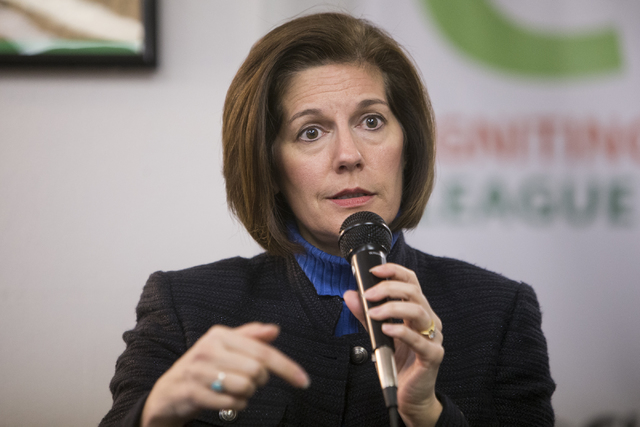Cortez Masto’s ‘no’ on Gorsuch comes down to philosophy
U.S. Sen. Catherine Cortez Masto says she approached her decision on the confirmation of Supreme Court nominee Judge Neil Gorsuch the way she used to prepare for cases as a lawyer: She did her research.
She dug into Gorsuch’s opinions on the 10th U.S. Circuit Court of Appeals, searching for insight into his judicial philosophy. She reviewed the often-frustrating confirmation hearings, in which candidates studiously avoid giving direct answers, lest they offer senators a reason to oppose their nomination. And she even invited Gorsuch to a meeting to discuss his ideas, although that ultimately didn’t happen.
In the end, her answer was no.
“I could tell that he is the type of judge who lives in a theoretical bubble,” Cortez Masto said Tuesday. “I want somebody on the bench who is cognizant of the impact of rulings on real life.”
According to Cortez Masto, a former two-term Nevada attorney general, judges should weigh the equities of a given situation and rule accordingly.
That’s pointedly not the same thing as deciding the preferred outcome of a case and writing a ruling to support that preference, regardless of the law, she stressed. But it does mean that judges understand how the cold, black print of statutes and precedents affects the lives of real people in the real world.
Cortez Masto’s analysis is important because of the way she views her job when it comes to Supreme Court nominees. Most of the people who are sent up to Capitol Hill by any president will be qualified to sit on the highest bench in the land. The question before her and her fellow senators, Cortez Masto says, goes beyond qualifications and into judicial philosophy and temperament.
“I think advice and consent doesn’t mean rubber stamp,” she says. “It matters who sits on the U.S. Supreme Court.”
And while Cortez Masto — a Democratic — does allow that Gorsuch may even be more conservative than the man he’s replacing, the late Justice Antonin Scalia, her objections aren’t rooted in politics alone. She freely admits, however, that she thinks he reached incorrect conclusions on some high-profile matters.
Conservative critics will no doubt accuse Cortez Masto of favoring activist judges, the kind Gorsuch himself abjured when he said “it is for Congress and not the courts to write new laws. It is the role of judges to apply, not alter, the work of the people’s representatives. A judge who likes every outcome he reaches is very likely a bad judge, stretching for results he prefers rather than those the law demands.”
But for Cortez Masto, the rub comes in applying those laws, especially as they operate in everyday life. For that, she says, Gorsuch has not shown sufficient sensitivity to gain her support.
In the end, however, that may not matter: Republicans have pledged to get Gorsuch confirmed even if they have to lower the threshold to invoke cloture to a simple majority from the current 60 votes. They say they’re simply following the precedent of then-Majority Leader Harry Reid, who changed Senate rules to allow executive branch appointees and non-Supreme Court judges to be confirmed with a simple majority.
Even Reid, who was fighting chronic obstruction, didn’t extend his rules change to Supreme Court confirmations. And even if he was cavalier about the significance of the move, there have got to be Republicans in the Senate who see visions of the next Ruth Bader Ginsburg nominated by the next Democratic president and confirmed by a simple majority.
“The first thing out of [Senate Majority Leader Mitch McConnell’s] mouth is ‘nuclear option,’” said Cortez Masto, using the Senate shorthand for the rules change. “That tells me he was going to do it all along.”
Contact Steve Sebelius at SSebelius@reviewjounal.com or 702-387-5276. Follow @SteveSebelius on Twitter.







